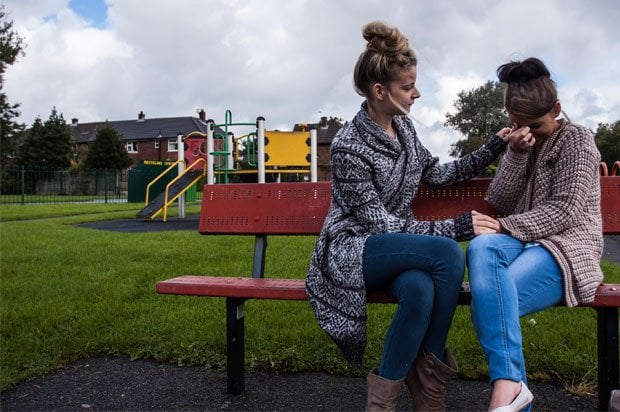Telling someone you self-harm
Self-harming is a personal thing and opening up to people can be scary, but it may be that you feel you want to talk about self-harm and the problems you are having. The Mix looks at how you can do this.

Make sure the first person you tell is someone you trust
Building up the courage to talk about self-harm
Finding the right time to tell people you self-harm can be the most difficult part. “It has to be the right time for you and the other person,” suggests Nigel Sampson, an adolescent specialist for the Child and Adolescent Mental Health Service (CAMHS) in Portsmouth. “Only tell them when you’re 100% sure it’s the right time for you. Wait until the other person is calm. Be honest and say you have something to share and that it may be a shock, but that you’re looking for help, not sympathy.”
You may have decided to speak in confidence to someone because it’s really getting you down, you’ve hurt yourself badly or you want to stop. But knowing how, and when, to tell people is the first step. Using the right tone of voice and being confident can help you and the person you’re telling feel more comfortable. One method mental health workers often advise young people to use to help them tell people about their self-harming is to share a diary. You don’t have to literally let them read it – use the diary as a prompt, like a script or notes, to help you feel confident about going through the thoughts you’ve had about injuring or harming yourself. If you haven’t written a diary, consider doing one for a few days before telling someone. It might help you talk more clearly when you do tell someone, whoever it might be.
Knowing who is best
Finding someone you can trust with personal information can be hard – someone who isn’t going to gossip, think you are mad, take control or reject you. Deciding who you feel most at ease talking to is all about going with your heart and being prepared to take a risk. Think about who has been there for you in the past – is it a teacher, lecturer, work mate, friend or family member? “Whoever it is, set boundaries around the conversation,” Nigel advises. “Just because you are telling that person it doesn’t give them permission to tell everyone else. Make sure the person you’re about to tell is someone you can rely on. Pick someone you know well who won’t get angry. Be clear that you’re telling them to seek help and that this doesn’t mean you’ll stop self-harming just because you’ve told someone.”
Dealing with people’s responses to self-harm
There will be people you talk to who don’t understand self-harm. They might find it uncomfortable to talk about or get embarrassed. Some people may even think you’re someone that they should stay away from. This might make you feel angry or rejected, especially if it’s a friend or family member.
It’s likely that you’ll feel much better after talking to someone, but be prepared that they might not react how you expect. “People do find it uncomfortable to talk about self-harming because they have little knowledge about the subject or because they think it means you have suicidal thoughts,” says Nigel. “But this is very often not the case.”
“Try and explain what self-harm is about for you, especially if the other person’s assumptions don’t fit,” suggests Frances McCann, from young people’s mental health service, 42nd Street .
Use your instincts
Having someone listen to you about your self-harming will help a lot. Use your instincts as your guide to how far you go with what you say to people. Consider the following tips from Nigel and Frances:
- Telling people about self-harming for the first time:Don’t rush through your story and do let the other person ask questions. Just don’t feel pressured to answer them all. If the other person becomes distressed, carry on the conversation another time.
- Being confident:Talking openly and honestly relaxes people. It shows an insight into why you’re doing it and helps make it clear it’s not attention seeking. You’re sharing something very personal with them, but be clear and confident in what you’re saying.
- Your injuries: You don’t have to show someone your injuries or scars – it’s up to you. However, if you are talking to a nurse or GP part of their role will be to check out if any wounds need treating.
The professionals
With something as private as self-harming, you’ll know the people that you can confide in safely; people you can trust. But if there is no one, or if you feel ready to take a new step to help yourself, there are lots of professional services out there that can help so don’t be afraid to ask.
Next Steps
- Our Crisis Messenger provides free, 24/7 crisis support across the UK. If you’re aged 25 or under, you can text THEMIX to 85258
- Under 19? You can get confidential help with self-harm from ChildLine – either over the phone or through an online chat.
- Anyone can contact the Samaritans on their 24-hour helpline to talk things through. 116 123
- RecoverYourLife.com is an online community where you can get peer support for self-harm and other mental health problems.
- Share your thoughts and stories about self-harm by video, picture or words at selfharmUK.
- Chat about this subject on our Discussion Boards.
By Anthony Burt
Updated on 23-Dec-2015
Sorry, comments closed
No featured article










